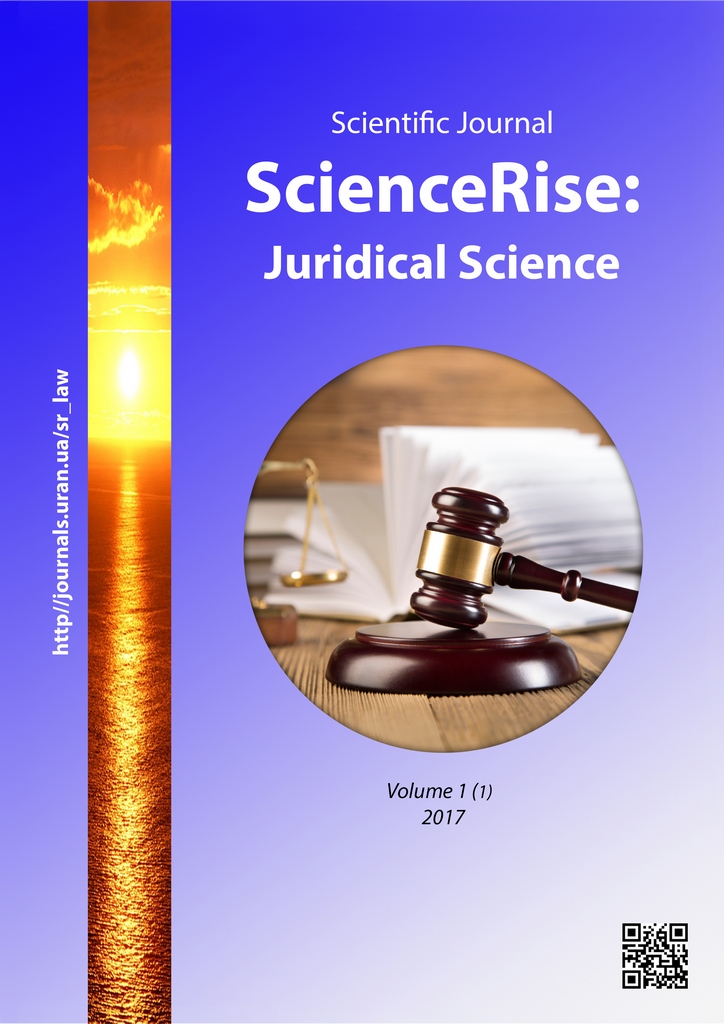Specificity of discretion in tax and legal regulation
DOI:
https://doi.org/10.15587/2523-4153.2017.111208Keywords:
fiscal relations, balance of interests, judicial discretion, presumption of legality of taxpayer decisionAbstract
It is stated that the problem of judgement in the tax-legal regulation cannot be considered as separate or relatively closed. An analysis of this form of realization of freedom of choice cannot be considered complete without the study of the problems of "discretion", "prejudice", "interpretation", "value judgement ". It is noted that the grounds of judgement in tax law regulation are: the nature and content of tax law norms, terminology of tax legislation, conflicts of legal norms, value judgements.
Judgement in tax regulation is an elaborate complex phenomenon, which determines its place at the junction of several branches of law and methods of regulation. The application of judgement in tax relations involves harmonization of the range of influence of tax regulations and the discretion of possibilities of their use. The complexity of judgement in tax regulations involves two aspects: the complexity of relations that are regulated in a similar way, and the complexity of the acts by which it is carried out.
The complexity of relations reflecting the situation, discretion of which should be realized, involves, apart from the availability of the tax sector, the groups of relations that are not directly tax, but without clarifying the origin and nature of which it is impossible to choose the subject of the judgement.
The complexity of acts involves, on the one hand, the participation in the implementation of judgemental acts related to various sectoral legislation (as mentioned above), and, on the other hand, the complexity of acts that characterize a single (rather notional) sectoral approach.
The substantial feature in the realization of the judgement of lawmaking subjects, power subjects, judicial discretion is the realization of the latter in the exercise of rights. At the same time, certain freedom of choice also characterizes the actions of the payer, when he, at his own discretion, chooses the possible options for the realization of his own tax liability. Freedom to choose the behavior option, taxpayer’s decision-making are both associated with the realization of dutyReferences
- Kuznecov, I. N., Samoshchenko, I. S. (Eds.) (1985). Pravoprimenenie v Sovetskom gosudarstve. Moscow: Yurid. lit., 303.
- Pudelka, Y. (2016). Administratyvnyi rozsud: poniattia ta rozmezhuvannia iz sudovym rozsudom. Porivnialno-analitychne pravo, 6, 197–199.
- Barak, A. (1999). Sudeyskoe usmotrenie. Moscow: Izd-vo NORMA, 364.
- Poliakov, I. I.; Kivalov, S. V., Kormych, L. I., Alenin, Yu. P. et. al. (Eds.) (2009). Rozsud u pravi: poniattia, oznaky i vydy. Aktualni problemy polityky, 38, 233–239.
- Kucheriavenko, M. P. (2009). Podatkovi protsedury: pravova pryroda i klasyfikatsiya. Kyiv: Alerta; KNT; TsUL, 460.
- Smychok, Ye. M. (2015). Yurydychni prezumptsyi u podatkovo-pravovomu rehuliuvanni. Kharkiv, 190.
- Semchyk, O. O. (2012). Suchasni kontseptsyi otsinochnykh poniat u pravi: do postanovky pytannia. Naukovyi visnyk Akademyi munitsypalnoho upravlinnia. Seriya: Pravo, 1, 215–221.
- Tymofieiev, O. O. (2010). Tlumachennia podatkovo-pravovykh norm. Irpin, 17.
- Podatkovyi kodeks Ukrainy. Verkhovna Rada Ukrainy. Available at: http://zakon3.rada.gov.ua/laws/show/2755-17
- Biudzhetnyi kodeks Ukrainy. Verkhovna Rada Ukrainy. Available at: http://zakon3.rada.gov.ua/laws/show/2456-17
- Konstytutsiya Ukrainy. Verkhovna Rada Ukrainy. Available at: http://zakon2.rada.gov.ua/laws/show/254%D0%BA/96-%D0%B2%D1%80
- Kodeks administratyvnoho sudochynstva Ukrainy. Verkhovna Rada Ukrainy. Available at: http://zakon2.rada.gov.ua/laws/show/2747-15
Downloads
Published
How to Cite
Issue
Section
License
Copyright (c) 2017 Mykola Kucheriavenko

This work is licensed under a Creative Commons Attribution 4.0 International License.
Our journal abides by the Creative Commons CC BY copyright rights and permissions for open access journals.
Authors, who are published in this journal, agree to the following conditions:
1. The authors reserve the right to authorship of the work and pass the first publication right of this work to the journal under the terms of a Creative Commons CC BY, which allows others to freely distribute the published research with the obligatory reference to the authors of the original work and the first publication of the work in this journal.
2. The authors have the right to conclude separate supplement agreements that relate to non-exclusive work distribution in the form in which it has been published by the journal (for example, to upload the work to the online storage of the journal or publish it as part of a monograph), provided that the reference to the first publication of the work in this journal is included.









